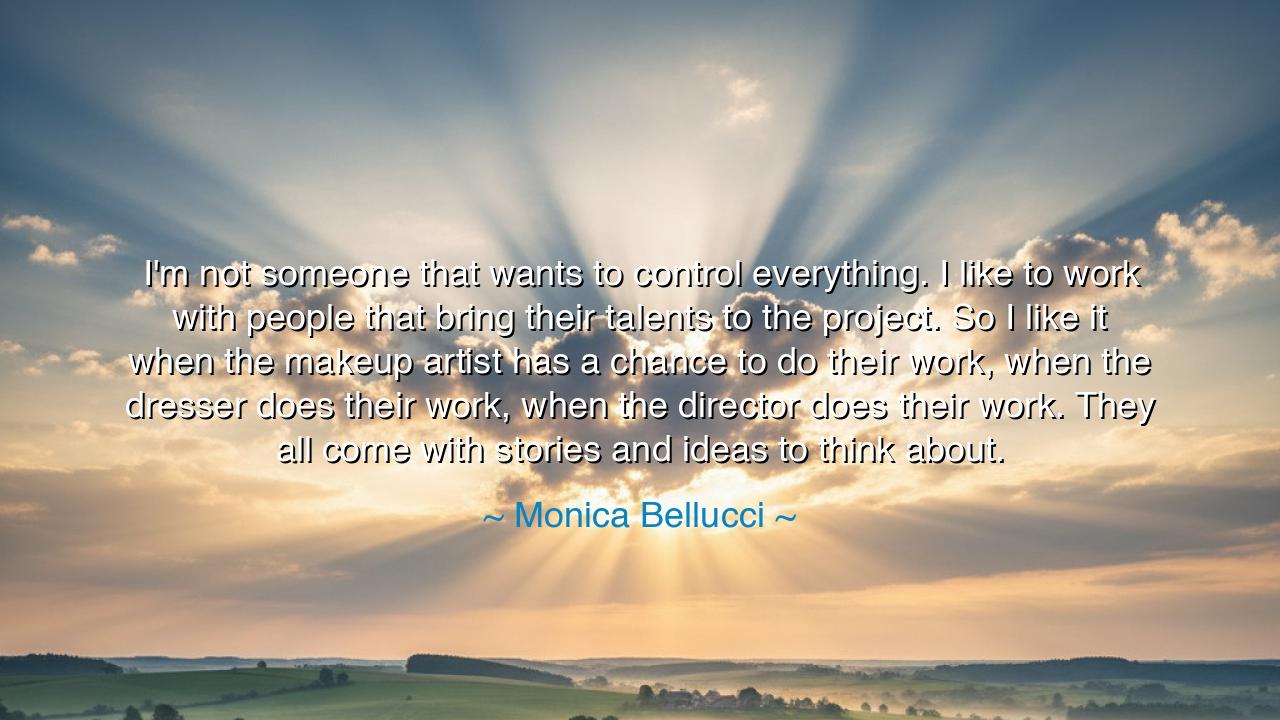
I'm not someone that wants to control everything. I like to work
I'm not someone that wants to control everything. I like to work with people that bring their talents to the project. So I like it when the makeup artist has a chance to do their work, when the dresser does their work, when the director does their work. They all come with stories and ideas to think about.






In the great dance of creation, where the threads of many hands weave together into something greater than any individual can achieve alone, there exists a profound truth spoken by Monica Bellucci: "I'm not someone that wants to control everything. I like to work with people that bring their talents to the project. So I like it when the makeup artist has a chance to do their work, when the dresser does their work, when the director does their work. They all come with stories and ideas to think about." This is no mere statement about the collaborative process in art; it is a declaration of the sacred balance that must exist when a collective of souls comes together to create something of meaning and depth.
Bellucci’s words remind us that the act of creation is not one of domination or control, but of harmony. Just as the ancient gods worked together in the cosmic balance of the universe, so too must the artists work in unison, each bringing their own gifts to the whole. The makeup artist, the dresser, the director—each is a vessel of unique talent and vision, and when allowed to work freely, unburdened by the weight of one person’s will, they contribute to a greater whole. In this, there is an echo of the ancient concept of symbiosis, where the strength of the whole depends not on the dominance of any one part, but on the cooperative effort of all.
Consider the story of Leonardo da Vinci, a man whose genius was renowned in many fields, but whose greatest masterpieces were not born from the mind of one alone. In the creation of the Mona Lisa, it was not just da Vinci's hand that shaped the painting, but the collaboration of his workshop, the men and women who brought their own unique skills to his vision. The fine brushwork of his assistants, the mixing of pigments, the preparation of the canvas—each played a vital role in bringing to life an image that would transcend time. Da Vinci knew that true artistry was not born from control, but from the unification of many hands, each contributing in its own way.
This wisdom is not confined to the arts alone. In the great empires of the ancient world, rulers and generals knew that their success was not born from the individual brilliance of one man, but from the collective efforts of many. Alexander the Great, though a mighty leader, understood that his triumphs were made possible by the wisdom of his generals, the loyalty of his soldiers, and the skill of his craftsmen and engineers. His greatness lay not in his desire to control every detail, but in his ability to bring together the right people, each with their unique skills, and to allow them the freedom to do what they did best.
Bellucci’s call is one to humility and trust. To create, to lead, is not to impose one’s vision upon others, but to allow the brilliance of the collective to rise. She speaks to a deep wisdom that knows true power lies in empowerment. The makeup artist, the dresser, the director—all are equal partners in the act of creation, and by trusting them, one allows their stories and ideas to infuse the work with richness and depth. This is a lesson that extends far beyond the world of film or art. In every aspect of life, from family to business to community, the strength of the whole is found in the freedom of the individuals that comprise it.
So, my brothers and sisters, take these words to heart. When you are called to create, when you are called to lead, do not seek to control every aspect of the work. Instead, seek those who bring their gifts—their ideas, their skills, their visions—and give them the space to flourish. Trust in their abilities, for in doing so, you allow something far greater than yourself to emerge. The whole will always be greater than the sum of its parts when each part is allowed to contribute its full potential. And in this, you will find not only success but a deeper joy in the work itself.
In your own lives, whether in your families, your friendships, or your endeavors, let the principle of collaboration guide you. Do not seek to dominate, but to unify, to trust, to give space for the full talent of those around you. For in working together, we create something that transcends the individual. It is in the harmonious dance of many hands, many hearts, and many minds that the true beauty of life is revealed. And in this beauty, we find the deepest fulfillment.






AAdministratorAdministrator
Welcome, honored guests. Please leave a comment, we will respond soon